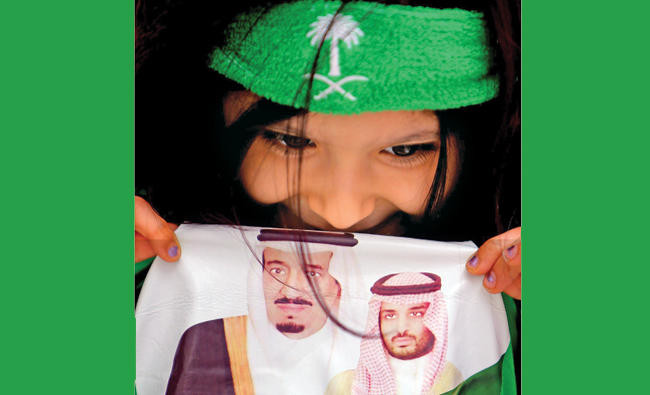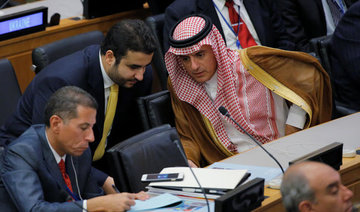RIYADH: With the launch of Vision 2030 and the National Transformation Program (NTP) 2020, Saudi Arabia has entered a new era of progress and prosperity which ensures integrated development in the Kingdom.
In recent years, Saudi Arabia has witnessed a series of developments in the fields of education, health, trade, communications, science and technology.
Launching Vision 2030 last year, Crown Prince Mohammed bin Salman described it as an achievable blueprint, which expresses long-term goals and reflects the country’s potentials and the projected future. It is a roadmap for economic and developmental action in the Kingdom.
Under this program, some governmental bodies and ministries underwent a restructuring process. This will enable them to perform their tasks, and expand their competencies to achieve a prosperous future and sustainable development.
Women are being given greater responsibility in society. The Shoura Council, which is a consultative body, has 30 women members out of its total membership of 150.
Recently, some female leaders were given highly responsible positions in public and private sector enterprises.
The education of women in the Kingdom has received a great deal of attention and this has allowed Saudi women to make definite strides toward achieving their ambitions in different fields.
The Saudi woman has emerged both at the local and international levels. Saudi women have excelled in the fields of culture and specialized research and their achievements have set records.
The King Abdul Aziz City for Science and Technology (KACST) plays a predominant role in the country.
KACST is a governmental scientific institution that supports and enhances applied scientific research. It coordinates the activities of government institutions and scientific research centers in accordance with the requirements of the development of the Kingdom.
It also cooperates with the relevant authorities to identify national priorities and policies in technology and science, so as to build a scientific and technological basis that serves development in agriculture, industry, mining and more. It also aims to develop national competencies and recruit highly qualified specialists to help develop and control modern technology to serve development in the Kingdom.
Its vision is to be a world-class organization in science and technology, fostering innovation and promoting a knowledge-based society in the Kingdom of Saudi Arabia.
For the first time in the Kingdom’s history, KACST recently produced three types of drones. The air drones, code-named Saqr 2, 3 and 4, are made of carbon and fiberglass and are characterized as light and durable to evade detection of radar and reconnaissance equipment.
The drones can be programmed from a ground-based control room. The newly created devices contain automatic control units, as well as logarithmic programs which can deal with and adapt to different wind speeds and temperatures, engine combustion, emergency landings, or climb or deviate from a flight path.
The drones will be used in cases of natural or environmental disasters, aerial photography, remote sensing and exploration, agriculture, border control and rescue operations.
In the health sector, there are more than 400 hospitals throughout the Kingdom which include some 125 private sector hospitals. Besides these hospitals, there are several medical cities and more than 2,000 primary health care centers.
During Hajj, the Ministry of Health alone deploys some 30,000 health officials to serve the millions of pilgrims who come to the two holy cities every year.
Education is a much-prioritized sector in the Kingdom. New schools are being built with state-of-the art technology to provide education to the growing population. The Education Ministry provides foreign scholarships to students who wish to pursue higher studies of their choice in major cities in the world in the UK, the US, Canada, Germany, Japan, Australia, New Zealand, France and India. There are more than 10,000 Saudi students studying abroad on government-funded scholarships.
There are some 39 universities in the Kingdom and some of them have achieved global recognition because of their state-of-the-art facilities.
The Princess Nourah University (PNU) is an example of the attention given to higher education for women. The attention started when the General Presidency for the Education of Girls established the first college for women in 1390 AH, corresponding to 1970 CE. The inauguration of more colleges followed, reaching 102, ranging from university colleges to intermediary and community colleges. These are found in 72 Saudi cities and include 600,000 students.
In Riyadh alone there are six colleges: The College of Education for Liberal Arts Disciplines; the College of Education for Scientific Disciplines; the College of Education for the Development of Teachers; the College of Social Services; the College of Home Economics; and the College of Fine Arts.
In 1427 AH, a royal order was issued for the establishment of the first university for women in Riyadh, under the supervision of the Ministry of Education. This includes the six colleges located in Riyadh, in addition to a number of new colleges established for the purpose of women’s education and development in the Kingdom.
Vision 2030 will take Saudi Arabia into the future, standing on the foundations of the past
Vision 2030 will take Saudi Arabia into the future, standing on the foundations of the past

Cabinet reviews Hajj 2025 plans as Dhul Hijjah begins

- Cabinet said the Kingdom takes pride in serving the Two Holy Mosques and receiving millions of pilgrims for Hajj, Umrah, and visits
RIYADH: Saudi Arabia’s Cabinet on Tuesday reviewed plans for this year’s Hajj season as the Supreme Court announced that Dhul Hijjah will start on Wednesday.
Hajj takes place during Dhul Hijjah and the pilgrimage will start on June 4 with pilgrims gathering in the Tent City of Mina.
The Cabinet said relevant authorities were operating with the highest standards of efficiency, quality, coordination, and integration, the Saudi Press Agency reported.
These efforts aim to ensure the comfort and safety of pilgrims, supported by the Kingdom’s extensive development projects and advanced infrastructure, which enhance all aspects of service and facilitate the performance of Hajj rituals for pilgrims from around the world, the Cabinet said.
The Cabinet said the Kingdom takes pride in serving the Two Holy Mosques and receiving millions of pilgrims for Hajj, Umrah, and visits. This reflects the Kingdom’s pioneering Islamic role and longstanding commitment since its unification by the late King Abdulaziz bin Abdulrahman Al-Saud.
The Cabinet also discussed the Kingdom’s participation in the recent summits between the Gulf Cooperation Council, the Association of Southeast Asian Nations (ASEAN), and China. These engagements reaffirm the Kingdom’s support for international initiatives promoting sustainable development and regional stability, contributing to a prosperous future for all nations, it said.
The Cabinet welcomed the announcement of a new oil discovery in the neutral zone between Saudi Arabia and Kuwait. It described the development as a positive step that enhances cooperation in the energy sector and reflects the success of joint exploration and development efforts.
The Cabinet also reviewed regional and international developments, reiterating the Kingdom’s ongoing efforts to support the Palestinian cause. It called for an end to the war on the Gaza Strip, the facilitation of humanitarian aid, and the cessation of violations by Israeli authorities of international laws and norms.
The Cabinet praised the launch of the Islamic Military Counter Terrorism Coalition’s regional program for Sahel countries, inaugurated in Mali. The initiative aims to strengthen cooperation among member states in combatting terrorism and its financing through joint action and the exchange of expertise.
The Cabinet lauded initiatives launched as part of the Health Sector Transformation Program which have enhanced the quality and comprehensiveness of healthcare, improved preventive and traffic safety measures, and advanced digital health services in line with the objectives of Vision 2030.
The Cabinet affirmed that the Kingdom remains committed to comprehensive and sustainable development through economic diversification, optimization of its competitive advantages, stimulation of local and foreign investment, empowerment of Saudi citizens, and the creation of job opportunities across various sectors.
Makkah Route Initiative: Enhancing the experience for once-in-a-lifetime journey

- The initiative involves dedicated services at 12 airports in 8 countries: Indonesia, Malaysia, Pakistan, Bangladesh, Turkiye, Morocco, the Maldives and Cote d’Ivoire
- Now in its seventh year, more than 1m pilgrims benefitted from the initiative, says ministry
RIYADH: The Makkah Route Initiative by Saudi Arabia’s Ministry of Interior aims to make the once-in-a-lifetime journey easy for foreign pilgrims by enhancing their Hajj experience.
Now in its seventh year, the initiative is carried out by the ministry as part of the Vision 2030 Pilgrim Experience Program.
The ministry recently announced that more than 1 million pilgrims have benefited from the initiative since its launch, reaffirming the Kingdom’s commitment to serving Hajj pilgrims.

Established in 2018 and activated in 2019, the initiative enables pilgrims to complete their entry procedures to Saudi Arabia at their home countries’ airports.
Upon arrival in the Kingdom, pilgrims and their luggage are directly transported to their accommodation in the two holy cities of Makkah and Madinah, avoiding long lines and wait times at the airport.
Pilgrims arriving under the initiative spend only a few minutes at the Saudi immigration counters.
HIGHLIGHTS
• Makkah Route Initiative enables pilgrims to complete their entry procedures to Saudi Arabia at their home countries’ airports.
• Pilgrims arriving under the initiative spend only a few minutes at the Saudi immigration counters.
It includes dedicated lounges at 12 airports in eight countries — Indonesia, Malaysia, Pakistan, Bangladesh, Turkiye, Morocco, the Maldives and Cote d’Ivoire.
Malaysian pilgrim Hasna Hamza, who arrived for her pilgrimage last week, expressed her heartfelt thanks to the Saudi government for facilitating the journey.

Aged 74, she described the process as “smooth, respectful and deeply spiritual.”
She completed her travel procedures in Kuala Lumpur — including biometric collection, health screening, passport validation and luggage processing.
Upon arrival in Madinah, she and fellow pilgrims were swiftly transferred to their accommodation with their luggage.

Naved Hasan, a Pakistani pilgrim told Arab News that the initiative enables pilgrims “to be fully committed to performing one of their holiest duties with peace of mind.”
Mohammed Mubarak, a Bangladeshi pilgrim, added: “Completing all the necessary procedures before leaving my home country saved me a lot of time and stress.”
The first group of 414 Bangladeshi pilgrims arrived at the Hajj Terminal of King Abdulaziz International Airport in Jeddah on April 29.

Bangladesh Ambassador to Saudi Arabia M. Delwar Hossain welcomed them at the airport, and assured that the Bangladesh Embassy, Consulate and Bangladesh Hajj Mission were available to support them.
The program, led by multilingual national teams and supported by advanced technology, ensures a smooth and spiritual experience for all pilgrims.
Underscoring Saudi Arabia’s commitment to pilgrims through the Makkah Route Initiative, Saudi Ambassador to Morocco Dr. Sami Al-Saleh said the initiative “streamlines Hajj procedures and ensures a peaceful journey for pilgrims traveling from their home countries to the Kingdom.”

Al-Saleh added that the widely embraced initiative in Morocco enables pilgrims to fulfill all travel procedures at Mohammed V International Airport in their home country.
Saudi Arabia launched the Makkah Route Initiative in the Maldives this week, making it the eighth country to benefit.
Officially inaugurating the initiative at Velana International Airport in Male on Monday, Maldives President Mohamed Muizzu presented the passport to the first pilgrim from a group of 234.
The ministries of media, health and Hajj and Umrah in Saudi Arabia run campaigns through social media to provide all the necessary information.
The Ministry of Hajj has reiterated that all intending to perform Hajj must obtain an official permit through the “Nusuk” platform, in technical integration with the unified digital platform for Hajj permits, “Tasreeh.”
The ministry emphasized that compliance with regulations is essential to protect the safety and well-being of pilgrims, and to ensure a smooth and secure Hajj experience.
In an official statement, the ministry stressed that no separate visa category — other than the official Hajj visa — grants its holder the right to perform Hajj.
Hefty fines up to SR100,000 ($26,000) will be enforced for anyone attempting to perform Hajj without the necessary visa.
The Makkah Route Initiative is run in coordination with several government entities, including the Ministry of Foreign Affairs, Ministry of Health, Ministry of Hajj and Umrah, and Ministry of Media, the Saudi Data and AI Authority, the Zakat, Tax and Customs Authority, the General Authority for Awqaf, the Pilgrim Experience Program and the General Directorate of Passports.
Saudi Arabia launches Makkah Route Initiative in Maldives

- Maldives is eighth country to benefit, following Indonesia, Malaysia, Pakistan, Bangladesh, Turkiye, Morocco, Ivory Coast
RIYADH: Saudi Arabia has launched its Makkah Route Initiative in the Maldives, making it the eighth country to benefit from the scheme.
The other seven countries are Indonesia, Malaysia, Pakistan, Bangladesh, Turkiye, Morocco and the Ivory Coast.
President of the Maldives Dr. Mohamed Muizzu inaugurated the route at Velana International Airport in Male on Monday, in the presence of the Chairman of the Makkah Route Supervisory Committee Lt. Gen. Sulaiman Al-Yahya, Minister of Islamic Affairs in the Maldives Dr. Mohamed Shaheem Ali Saeed, and several other officials.

The President’s Office posted on X: “President Dr @MMuizzu officially inaugurates the Makkah Route Initiative, accompanied by first lady madam @sajidhaamohamed.
“The president presented the passport to the first pilgrim utilizing the Makkah Route Initiative, while the first lady presented the passport to the second pilgrim.”
The first group of 234 Maldivian pilgrims left Male Airport under the initiative for Saudi Arabia.
This is a tremendous honor for the Maldivian people.
Dr. Mohamed Shaheem Ali Saeed, Maldives Minister of Islamic Affairs
Speaking at the inauguration ceremony, Ali Saeed described the occasion as a proud moment for all Maldivians.
The Ministry of Islamic Affairs in the Maldives said it noted that the positive changes initiated in Hajj affairs under Muizzu’s administration were now coming to fruition, transforming the pilgrimage experience for Maldivian pilgrims.
The minister said: “This is a historic page in our efforts to ease and enhance the Hajj journey for our citizens.”
Ali Saeed expressed sincere gratitude to Muizzu for his strong support and commitment to making the Makkah Route Initiative a reality for the Maldives.
He further revealed that the inclusion of the Maldives in the Makkah Route Initiative was made possible through special exemptions granted by Saudi Arabia, with the personal approval of King Salman.
“This is a tremendous honor for the Maldivian people,” he added, recognizing the close and valued relationship between the two nations.
The Makkah Route Initiative is designed to provide high-quality services to pilgrims from beneficiary countries by streamlining travel procedures in their home countries and facilitating the smooth and seamless completion of process at their designated embarkation points.
This includes collecting biometric data, electronically issuing Hajj visas, completing passport procedures at the departure airport following health verification, coding and sorting luggage according to transportation and accommodation arrangements in the Kingdom, and transferring pilgrims to buses to their residences in Makkah and Madinah.
Partner agencies are responsible for delivering the luggage to pilgrims’ accommodation in the holy cities.
Saudi deputy minister meets Portuguese foreign ministry official

- The two officials headed the second round of political consultations between the two countries
RIYADH: Saudi Deputy Minister for Political Affairs Saud Al-Sati met Helena Malcata, director-general of foreign policy at the Portuguese Ministry of Foreign Affairs, in Riyadh on Tuesday.
The two officials headed the second round of political consultations between the two countries, the Saudi Foreign Ministry said in a post on X.
During the meeting, the two sides discussed bilateral relations and ways to enhance them in various fields.
Portuguese Ambassador to the Kingdom Nuno Matias was present during the meeting.
Saudi Arabia condemns storming of Al-Aqsa Mosque

RIYADH: Saudi Arabia on Tuesday condemned the storming of the Al-Aqsa Mosque compound by Israeli officials and settlers under the protection of Israeli forces on Monday.
The Kingdom’s Foreign Ministry reiterated its condemnation of the continued flagrant violations of international law and brutal attacks on the sanctity of Al-Aqsa Mosque.
Crowds of Israelis streamed through Jerusalem’s Old City, where some scuffled with residents and hurled insults at Palestinians, as annual celebrations of Israel’s capture of east Jerusalem took place on Monday.
Far-right Israeli minister Itamar Ben Gvir stormed the Al-Aqsa mosque compound, known to Jews as the Temple Mount, to mark the occasion.
Jerusalem Day, as the celebrations are known, commemorates Israeli forces taking east Jerusalem during the 1967 Arab-Israeli war.
The Kingdom affirmed its categorical rejection of anything that undermines the historical and legal status of Jerusalem and its holy sites.It called on the international community to hold Israeli authorities accountable for their ongoing violations against Islamic holy sites and innocent civilians in Palestine.






















